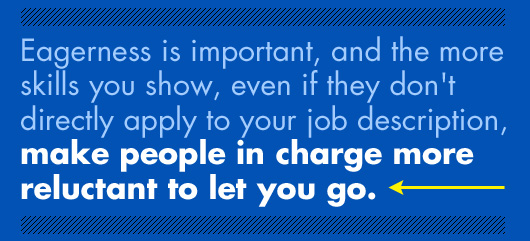For a lot of us, we're entering our first “career” job. Thanks to either graduating college or simply moving up a ladder, most of us have made the jump from more hourly positions we had in high school like retail, food, and service industries, to more management and office positions in fields that we could ideally stay in for the rest of our lives. In the past, these fields would have been labelled as “blue-collar” and “white-collar,” although those terms are considered old-fashioned now that technology has started to blur the lines between them.
While the terms may change, one thing stays the same: There is a noticeable difference between the two work environments. Atmosphere, expectations, relationships, all are different now, and they can be a shock if you aren't prepared. While a large amount of it is learned simply through trial-and-error, there are a few ideas to make a good impression if your starting a new job:
Try coming in early and leaving late
While this might be seen as the hallmark of the nerdy, ladder-climbing suckup, I only suggest it because, frankly, there is a lot in it for you as well beyond just making a good impression. If simply being able to avoid the worst of rush-hour traffic wasn't enough (it is for me,) Tim Ferris mentioned in his book The Four Hour Workweek that he was able to get the majority of the day's work done in his first hour. Not only by being more productive without the typical office distractions, but because, since most secretaries work on a 9-to-5 schedule, by contacting people before the “gatekeepers” came into work for the day, he was able to bypass them and speak directly to the people in charge.
Work a little outside your station (cautiously)
This might simply be a pet peeve from by own bad experience as opposed to a common thing, but when I was paying my dues chained to a cash register, I noticed that any time an employee or customer attempted to talk to one of our managers, it was pretty common for them to simply say “not my problem” and walk in the other direction.
I realized much later that I simply had a rogues gallery of horrible bosses, but the lesson I learned stuck with me. Be willing to work outside your sphere. Eagerness is important, and the more skills you show, even if they don't directly apply to your job description, make people in charge more reluctant to let you go. I impressed one interviewer by helping to fix his printer (apparently, everybody else in the office would simply wait for IT to come deal with it.) Every workplace has a few jobs that no one really likes doing, but if you just take a deep breath and jump in, you can get them done and score some major points with the people in charge at the same time.
There is a major caveat to this however. There is a fine line between “being helpful” and “being taken advantage of.” It's a personal judgement call where that line is being drawn, but it's usually a good idea to occasionally reflect and see if you've gone from being eager to being the office flunky. Because of that, it's important to…
Learn to Say No Diplomatically
While volunteering to do the occasional bit of work outside your station is good, times will arise when you simply can't or shouldn't. In many cases, the person asking doesn't know something is outside of your skill set, so simply saying “no” can come across as rude. Learn to always give a reason if you plan to refuse something, and it's usually a good idea to offer to help them find another solution, even if it's just suggesting someone who's better able to help them.
Socialize with everybody
Quite a few business leaders, when asked for advice, will usually say something to the extent of “never eat lunch alone.” Networking is vitally important. Whether it's making new connections or simply encouraging the ones you have, strengthening your roots in your workplace and in your industry is essential. However, a lot of people develop the habit of only socializing within their own circle. People acquainted with more working-class jobs are used to a more “top-down” heirarchy, where the boss makes the rules, you follow them, and you don't question him. However, the higher up the ladder you move, the more egalitarian the system becomes.
I first noticed this in college. Despite our professors posting office hours and repeatedly saying “Our door is open, come by anytime,” quite a few of us, myself included, were reluctant to take them up on the offer, mostly out of nerves because professors were “the boss,” and you didn't mess with them. Classmates who grew up in different upbringings usually had no problem talking to professors, and were better off for it. Try to break the ice with your bosses, sooner rather than later.
Keep Calm
When you're at your first job, you aren't able to gauge the severity of your mistakes. Is something like missing a deadline a situation where heads will roll? Or it is something that's frowned upon, but understood as inevitable? Because of this, it's easy to get high-strung about everything. You'll make a good impression if you're able to keep your cool, even when emotions are high and you might be the only calm person in the room. Not to mention being level-headed is a desirable trait in a team leader, which can bode well for your future.
Many people have stumbled on the first few steps in their chosen career path. If you've started a new job in the last little while, you've probably been a little surprised by the change in culture. However, one thing that's universal is first impressions are vitally important. Try to make a good one, and things will go much easier.

















